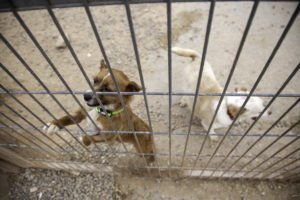Dog laws in Nevada tend to vary by city and locality. Here are five key things to know:
- In the city of Las Vegas, every dog (and cat and ferret) at least four months old must be licensed and have been vaccinated for rabies.
- Pet owners in unincorporated Las Vegas do not need to license their dogs, but they do need to vaccinate them for rabies once they turn three months.
- If you are in Henderson or North Las Vegas, contact the local Animal Control.
- Dog leashes in public are generally required in both incorporated and unincorporated Las Vegas.
- Not using a leash in public (other than in dog parks) is a misdemeanor carrying up to six months in jail and/or up to $1,000 in fines.
In this article, our Nevada personal injury attorneys discuss these and other dog laws in Las Vegas:
- 1. Who can own dogs?
- 2. Must dogs be licensed in Nevada?
- 3. Are training attack dogs and dog fights legal in Nevada?
- 4. What are Nevada’s animal cruelty and neglect laws?
- 5. What are the leash laws in Nevada?
- 6. What is the owner’s responsibility in dog bite cases?
Bitten by a dog? Learn about filing a dog bite lawsuit.

Dogs in Nevada must have rabies vaccinations from a licensed veterinarian.
1. Who can own dogs?
Anyone can own dogs in Nevada unless they have been legally prohibited from doing so. Children may own dogs, though their parents or guardians would also be liable for them.
2. Must dogs be licensed in Nevada?
Laws vary depending on the municipality.
In unincorporated Clark County (which includes most of Las Vegas), dog licenses are not required. However, dogs must wear a current owner ID tag or a microchip device. In addition, dogs must display a current rabies vaccination tag and be neutered.1
Meanwhile, dog license tags are mandatory within every municipal city limit in Clark County:
|
Incorporated cities in Clark County requiring a dog license |
Age when a dog must be licensed |
| Las Vegas (which includes Downtown) | Older than 4 months of age
|
| Henderson | Older than 3 months of age
|
| North Las Vegas | Older than 3 months of age
|
| Mesquite | Older than 6 months of age
|
| Boulder City | Older than 4 months of age
|
Proof of rabies vaccination is always required to get a license. The dog must be spayed or neutered.2
Note that dog licenses generally must be renewed annually.
3. Are training attack dogs and dog fights legal in Nevada?
Nevada law prohibits dog fights and all dogfight-related activities. Penalties increase with each successive conviction.
3.1. Running a dogfight
Nevada law makes it a crime to cause, promote, assist, or in any way aid in furthering a dogfight. It is irrelevant if no gambling is involved.
|
Running an animal fight |
Nevada penalties |
| 1st-time offense | Category D felony
|
| 2nd-time offense | Category C felony
|
| Successive offense | Category B felony
|
3.2. Keeping, training, selling, or buying fight dogs
It is also a crime in Nevada to either:
- possess, train, or purchase a dog with the intent to use it to fight another animal, or
- sell a dog knowing that it is meant to fight another animal
|
Training/buying/selling fight dogs |
Nevada penalties |
| 1st-time offense | Gross misdemeanor
|
| 2nd-time offense | Category E felony
Probation and a suspended sentence. (But if the defendant has two or more prior felony convictions, the court may impose one to four years in Nevada State Prison and up to $5,000 in fines.) |
| Successive offense | Category D felony
|
3.3. Watching a dog fight
Finally, Nevada law prohibits people from watching a dogfight. It is irrelevant if they placed no bets.
|
Being spectators at a dogfight |
Nevada penalties |
| 1st-time offense | Misdemeanor
|
| 2nd-time offense | Gross misdemeanor
|
| Successive offense | Category E felony
Probation and a suspended sentence. (But if the defendant has two or more prior felony convictions, the court may impose one to four years in Nevada State Prison and up to $5,000 in fines.) |
To learn more, go to our article on Nevada dogfighting laws (NRS 574.070).3

Enclosing an animal in too small a space for its size is a form of animal cruelty in Nevada.
4. What are Nevada’s animal cruelty and neglect laws?
Nevada law prohibits the unjustifiable torture, maiming, or killing of dogs. Penalties depend on the defendant’s state of mind.
|
Purpose of torturing or killing a dog |
Nevada penalties |
| The defendant means to threaten, intimidate, or terrorize another person | Category C felony
|
| The act is committed willfully and maliciously | Category D felony
|
Note that poisoning a dog is typically prosecuted as a gross misdemeanor, carrying:
- up to 364 days in jail, and/or
- up to $2,000 in fines5
Nevada law also makes it a crime to restrain a dog for more than 10 hours during a 24-hour period. The following dog restraints are outlawed:
- prongs,
- pinches,
- choke collars, or
- any tether, chain, tie, trolley, or pulley system that:
- is shorter than twelve (12) feet, or
- impedes the dog from moving at least twelve (12) feet, or
- permits the dog to reach a fence or other object that may cause the dog to become injured, entangled, or to die by strangulation after jumping the fence or object
In general, the penalties for animal abuse or neglect increase with each successive conviction within seven (7) years of the first offense.
|
Animal cruelty |
Nevada penalties |
| 1st-time offense within 7 years | Misdemeanor
|
| 2nd-time offense within 7 years | Misdemeanor
|
| Successive offense within 7 years | Category C felony
|
Note that Nevada has special laws prohibiting abuse of police dogs and show dogs. Learn more in our article about animal cruelty laws.
Also, note that dog racing is not a crime in and of itself. But it becomes illegal when it is done for gambling purposes. Learn more about dog racing as a gaming activity (NRS 207.235).
5. What are the leash laws in Nevada?
Nevada’s general rule is that dogs must be on leashes in public with the exception of dog parks or some rural areas. But check your local laws since leash laws are typically regulated on the county- or municipal level.
Not using a leash when required is usually a misdemeanor punishable up to six months in jail and/or up to $1,000 in fines.7
6. What is the owner’s responsibility in dog bite cases?
Nevada law generally follows the “one bite rule“. Unless dog owners are negligent, they are usually not liable for dog bites if their dog never bit anyone before.
But after a dog has bitten someone, the owner can be liable for compensatory damages depending on whether the dog is considered “dangerous” or “vicious.”8
Learn more about Nevada’s dog bite laws.
Helpful Links
- Clark County Animal Control Officer
- The Animal Foundation – Animal Shelter and Low-Cost Vet Clinic
- Las Vegas City Council
- Service Animals – Nevada Disability Advocacy and Law Center
- Las Vegas Municipal Code – Impoundment
Legal References
- Clark County Code 10.08.
- Las Vegas Municipal Code Title 7. Henderson Municipal Code Title 7. North Las Vegas Municipal Code Title 6. Boulder City Municipal Code 7-3-3. Mesquite Municipal Code Chapter 3 and chapter 7.
- NRS 574.070.
- NRS 574.100. See also Lee v. State (2018) 415 P.3d 22.
- NRS 574.150.
- NRS 574.100. See also PetSmart, Inc. v. Eighth Jud. Dist. Ct. (2021) 499 P.3d 1182. SB 269 (2023).
- See notes 1 and 2.
- See notes 1 and 2.

